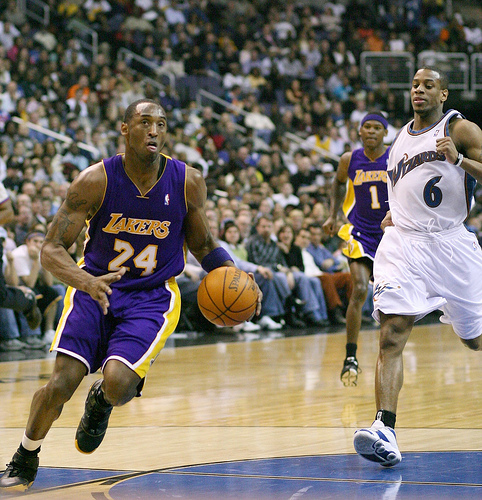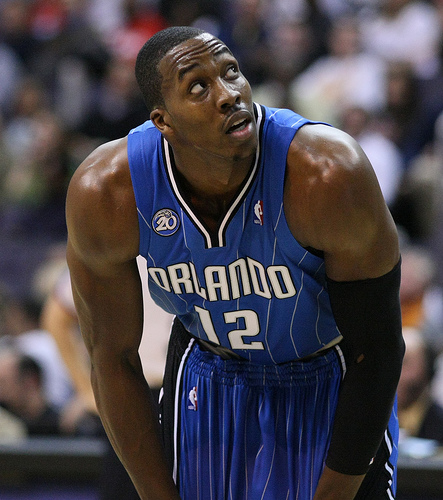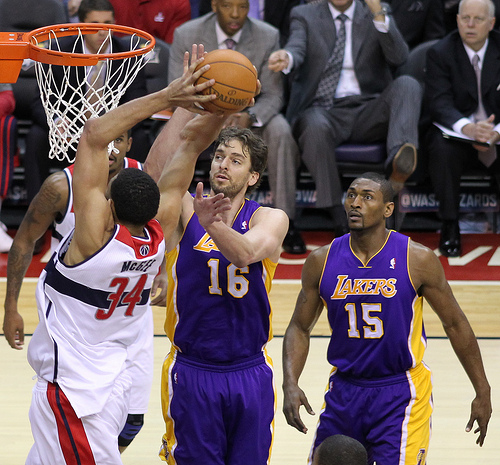2012-13 NBA Roundtable: Lakers Edition

1) Is Kobe Bryant still in his prime, or do you think he’ll take a step back this season? How much less (if it all) will Kobe be involved in handling the ball and do you expect to see a decline in his production and performance this season?
Tanaya Ghosh: Yes. Although he's come to terms with the fact that he'll have to retire eventually, Bryant's competitive nature still drives him. However, physically and even a bit mentally, he has lost some of his edge as compared to his prime. Not even Kobe is immune to aging- his latest foot injury for instance- and has hinted multiple times that he's thinking of retiring in the somewhat near future. It's not what Laker fans want to hear, but it's the harsh reality of the game. Still, although his performance may be on the slight decline, he's still a top-notch athlete and better than most other shooting guards in the NBA.
Michael Huettner: Kobe Bryant, at age 34, is definitely past his personal prime. You won’t see the quickness and leaping ability you saw from Kobe in his younger days, but he’s added enough weapons to his arsenal that he can still get the job done. He’ll see a decline in his ball handling duties with the addition of Steve Nash and the frequent ball movement needed in the new Princeton offense, but will also get more easy looks in the new offense with frequent backdoor cuts and opposing defenses worried about containing Dwight Howard and Pau Gasol. This is Kobe we’re talking about though- he’ll make sure he gets his points.
Annette Irwin: Age-wise, Bryant is not in his prime at age 34. He still has a couple of years left in the tank though because after all, he is Kobe Bean Bryant. Bryant is average defensively at this point, but is still an elite scorer on offense (27.9 PPG in 2012). He will take fewer shots late with the additions of Steve Nash and Antawn Jamison, but there is no question this is still Kobe’s team.
Bo Kwan: Kobe is not in his prime physical condition anymore, and there might be a obvious decline in his performance this season, especially after his injury in a preseason game against the Kings. Despite this, he is still the best team player in the league and will find a way to make a major contribution to this team.

Ghosh: Although this combination probably wouldn't have worked as well with a younger Kobe, now that he has accepted that he's not where he used to be physically, he'll be more willing to share the backcourt in order to make another championship run. Since Nash is starved of a championship, his hunger for the ring will drive him to be more than willing to compromise and do whatever it takes to win. Both veterans can make each other better if they're willing to adjust, which applies more so to Kobe. The two-time MVP can also bring maturity and a locker room presence that has been lacking since Fisher's departure.
Huettner: Kobe and Nash might have some chemistry issues early on in the year, but should end up forming a dynamic backcourt. A key reason these two will work well together: Nash likes to pass and Kobe likes to shoot. Nash running the pick-and-roll with Howard or Gasol will force the opposing defense to clog the middle and leave Kobe open for spot-up jumpers. And on nights when Kobe is hot, teams will be forced to double him, which will often leave Nash, a 43% career 3-point shooter, open beyond the arc.
Irwin: Nash and Bryant will make up arguably the best starting backcourt in the league. Both are old, but still playing at an elite level. Nash possesses an uncanny basketball IQ, and is still one of the best three-point and free-throw shooters and floor generals in the game. Nash’s ability to set his teammates up for uncontested shots will benefit Kobe, who will no longer need to force up his own shots. I don’t foresee any problems emerging because Nash is a pass-first guard while Kobe is a flat-out scorer.
Kwan: This could be a major problem, as the two did not look on the same page at times during the preseason. Nash is a point guard who need his teammates running fast and constantly moving, while Kobe's offensive game is based on a stationary, positional attack. Kobe will need to move more off the ball than ever before.

Ghosh: Now that Bynum is gone, Howard's maturity and consistency add an edge that makes him a better replacement almost by default. Winning Defensive Player of the Year three times, Howard is known for being a beast on defense and a rebounding and shot-blocking machine. Howard is also agile for a big man, and his athleticism is a huge asset. Between Howard and Kobe, there will be plenty of opportunities to draw the defense to create more scoring options for the rest of the team. Howard will also be good for running the pick-and-roll, especially with Nash running the point. However, I see his main contribution being on the defensive end, which is what the Lakers need anyways.
Huettner: Dwight’s alley-oops from Nash might be what ends up on SportsCenter’s Top 10, but his defensive presence is his biggest contribution. The Lakers need a big man to protect the rim with an aging backcourt that is sure to give up a lot of lane penetration. Howard is also a great pick-and-roll defender, which was one of the Lakers biggest weaknesses last year with Andrew Bynum at center. On the offensive end, Howard should get a lot of opportunities with the post being the first option in the new Princeton offense. He should catch the ball in great position down low because he’ll be cutting and coming off screens.
Irwin: Dwight Howard biggest impact will be his defensive force. He’s averaged 2.2 blocks per game his career and is a three-time Defense Player of the Year. His combination of his size and skill devastates the opponents in the paint and will fit in nicely in Mike Brown’s offense. Let the Nash-to-Howard alley-oops and pick-and-rolls begin.
Kwan: There hasn’t been a center like this in Los Angeles since Shaq left. Howard is a better version of Nash’s old running mate Amar’e Stoudemire in some areas, which will make him a great teammate for Nash. Nash needs a strong and fast post player, and Howard is the best type of that player in the league.
4) A big topic of scrutiny last season was the Lakers’ depth. Antawn Jamison, Jodie Meeks, and a re-signed Jordan Hill are the big additions. What will be the biggest strengths of the current group of bench players, and will it be better than 2011’s second unit?
Ghosh: The Lakers have nowhere to go but up after last season's dismal showing from the bench. An accomplished two-time All-Star, Jamison will likely be a valuable asset coming off the bench as sixth man. Hill brings youth and enthusiasm to ignore scoring runs, while Meeks brings shooting talent, especially with the open jump shots he’ll be taking as other Lakers draw double-teams. Meeks will be most effective if he can capitalize on the catch-and-shoot opportunities from the perimeter.
Huettner: The Lakers bench will be better than last year for one main reason: it can’t be any worse. The bench was a league-worst last year, scoring only 20.5 points per game, and should improve with the new additions. The one major improvement over last year’s second unit is three-point shooting. Last year’s squad couldn’t shoot a lick, so bringing in Jodie Meeks and Antawn Jamison should help with that. Both of these guys struggled in the preseason, but they should help bolster the bench as the year goes on.

Kwan: The second group of Lakers did a fair job in the preseason. Jamison's performance will fulfill expectations and greatly improve the bench. However, Jordan Hill is the weakest player in the second unit. He needs to improve his fundamental skills in rebounding, passing, and set-shooting in order for this team to make a deep playoff run.
5) How do you think the Lakers will finish, and how far will they go in the playoffs?
Ghosh: Bryant, Howard, Nash and Gasol make up a "Big Four" as hyped as the 2004 season, when Karl Malone and Gary Payton joined Kobe and Shaq. However, as fans eventually learned eight years ago, what looks good on paper may not always play out that way. It is likely that the Lakers will win the Pacific Division again at the very least, but it is uncertain how much farther they'll be able to go again this year. Chances of winning it all are still slim, but the outcome will depend on whether the chemistry will start work out (or not) deep into the regular season.
Huettner: Despite trading away James Harden, the Thunder, along with the Spurs and the Clippers, will still be a very tough challenge for the Lakers. If the Lakers are able to stay healthy throughout the year, they will beat the Thunder in seven games to make it to the Finals. As for the Miami Heat, if the Lakers can use the regular season to form solid chemistry, then the Heat won’t be able to stop Gasol and Howard down low. The Heat still have LeBron James though, so I think the Lakers will fall in seven games to Miami.
Irwin: I think the Lakers will finish first in the Pacific Division and second in the West behind the Oklahoma City Thunder. It’s hard to bet against the younger, more dynamic, and more athletic team like Thunder even after the recent shocking trade of James Harden to the Houston Rockets. The Lakers will blow by teams with their talent alone, and if they can put egos aside and work together as team, it is not unreasonable to think the Lakers will return to the NBA Finals.
Kwan: No team can go far unless they have a good coach, and Mike Brown does not qualify to lead this team in my opinion. Although the Lakers may have the most talent on their roster, their stars don’t fit together. The acquisition of Nash reminds me of the 2004 team as well, and I don’t expect the Lakers to do better than last season.
Our other panel previewed the Los Angels Clippers' season.



